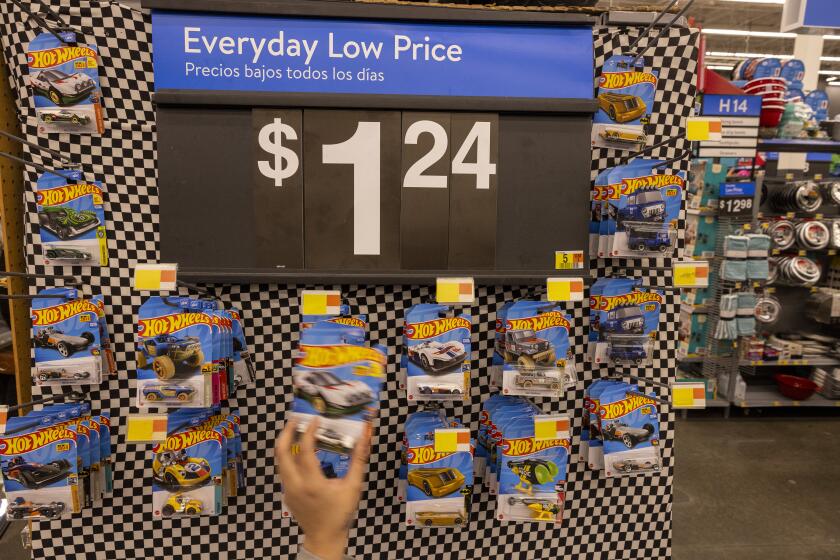Volvo’s Polestar plans subscriptions, stores to push its new electric luxury cars
To promote the sales of its new electric cars, Volvo’s performance luxury brand will let customers choose from an all-inclusive subscription model that combines automotive costs such as insurance and maintenance into a single monthly payment. No money will be required upfront.
It’s less like car leasing or sharing, and more like Netflix.
Polestar Performance AB is the performance luxury brand of Volvo Cars, owned by Zhejiang Geely Holding Group Co. The company launched a hybrid-electric, the Polestar 1, last year and plans to debut an all-electric, the Polestar 2, next year.
It is joining a crowded field. Audi, BMW, Jaguar, Porsche and Mercedes-Benz have all introduced pure-electric vehicles in the past six months. They are chasing Tesla, the luxury-electric leader.
The $155,000 Polestar 1 has slowly been making the rounds, first in Europe at this year’s Geneva Motor Show, and later in California at Pebble Beach. Its three electric motors and one combustion engine get the equivalent of 600 horsepower and what the company claims will be “the longest pure electric range of any hybrid in the world.”
Polestar plans retail spaces for North America that will be no-commission “guide shops” where buyers can evaluate the cars in real life without feeling pressure to buy from salespeople. Consumers will also be able to research, configure and purchase the Polestar vehicles online at any time.
The model is similar in some regards to that of Tesla, which installed boutique shops in trendy neighborhoods as it rolled out its cars, rather than using traditional car showrooms and dealerships.
“Within the time of getting to know the brand there comes a time when you want to go and touch and feel it,” Thomas Ingenlath, the global CEO of Polestar, said.
It’s also similar in function to how Apple runs its shops. The fact that company staff won’t work off a sales commission means it won’t make a difference to them whether the customer buys the car online or in a store, Ingenlath pointed out.
“That gives them the freedom in mind to be a partner in trying to give consumers the best experience,” said Ingenlath, who worked for years in the design sector for Volkswagen Group. “It’s not all about selling Apple products there. Nobody is pushing them, ‘Get that thing now!’ Nobody likes that. At the end of the day you may go home and buy online, but that doesn’t matter to Apple, either.”
Polestar North America will open its first retail space in New York City in late 2019 or early 2020, with additional “Spaces” in Canada soon to follow. This despite the fact that California will likely be one of the biggest markets, if not the biggest, for the Polestar 1 and 2 in the next few years.
“At the moment the talks for the retail space has most progressed here in New York — finding the right location, getting a contract together that both sides agree on,” Ingenlath said. Representatives from Volvo’s electric performance brand also said they have also been meeting with 60 retailers worldwide to represent Polestar, with shops in each of the first markets to open in time for deliveries of its hybrid and electric coupes.
Production of the Polestar 1 will start in mid-2019 at the new Polestar Production Center in Chengdu, China. (Corporate headquarters for Polestar is located in Gothenburg, Sweden.) Polestar will reportedly make 500 of the vehicles worldwide; all 200 of the first-year models designed for North America have been sold. The limited availability and higher price of the car are by design.
Polestar 2, the company’s first full-battery electric vehicle, will debut in the first quarter of 2019. It is a lower-cost sedan Polestar started developing three years ago to compete against the Tesla Model 3.
After the Polestar 2 debut, the company will introduce the Polestar 3, a small electric SUV, as soon as possible in the years following. Ingenlath said it’ll hit just as the EV mentality takes over, even despite detractors who say clean diesel or other alternative fuels may be more eco-friendly.
Elliott writes for Bloomberg News.
More to Read
Inside the business of entertainment
The Wide Shot brings you news, analysis and insights on everything from streaming wars to production — and what it all means for the future.
You may occasionally receive promotional content from the Los Angeles Times.










